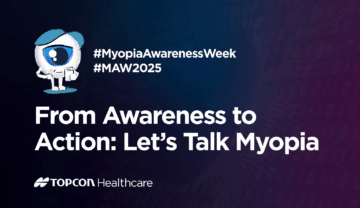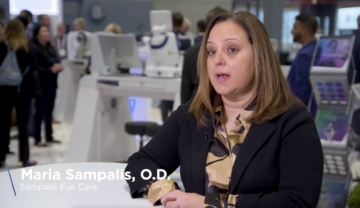
Celebrating World Optometry Day
On World Optometry Day 2022, we’re celebrating world-class optometrists like Dr. Glenda Aleman Moheeputh who help patients to see their way through the world. We recently had the opportunity to speak with Dr. Moheeputh to discuss her passion for eye health, why she joined the eye health sector and how she continues to make a difference.
The History of World Optometry Day
World Optometry Day is celebrated on March 23rd as a symbol of celebrating optometry as a profession. It dates back to 1986, when Dr. G. Burt Holmes, former president of the American Optometric Association, took ownership of IOOL (International Optometery and Optical League) and transformed it into a dynamic organization committed to improving vision care standards all around the world.
Following that year, Dr. Holmes proposed to celebrate World Optometry Day as a way of raising the bar in optometric education at the global level by establishing the first Wednesday of March as an international day for optometry.
What sparked your passion for optometry?
When I was 18 years old, I was introduced to optometry through my first job working at a high-end optical in Honduras; ever since then, I have been fascinated with eyes. I love Optometry because it allows me the opportunity to let people experience life in the most fulfilling way possible.
We need to change the way we look at myopia. Myopia is not just a refractive error but an epidemic and a big socioeconomic and health issue. Our young patients are the future, and as an optometrist, we are at the forefront of this disease. We have the tools and responsibility to take action and make a significant impact on the future of our patients and our world.
Glenda Moheeputh
You’ve built an extensive network of esteemed colleagues and fellow practitioners; how big of a role has your optometric community played throughout your career?
It is vital to my practice that I remain actively involved in the optometric community. Being active in your local optometry society shows other optometrists that you are supportive of their careers and appreciate the knowledge we have to learn from each other. By being proactive in the community, I have gained the respect of my colleagues, which has been crucial in establishing myself as a myopia management expert.
March is Women’s History Month; as an entrepreneur and industry leader, how do you forge an inclusive work culture for yourself and other women?
I have always known the importance of developing and mentoring others even in the early days of my career as an optician and optical manager. I mentored several of my technicians become Licensed Opticians and several, (14 to be exact) went on to become optometrists, they are now my fellow ODs. As women ODs, we face unique challenges, and we must help each other succeed. That is why I am thrilled to be an Elite Ambassador of Optometry Divas. As an ambassador, I get to empower, connect and promote the success of women ODs all over the country.
Lastly, as the founder and CEO of both OK Love and iSmart Vision Care, how do you hope to contribute to the world of optometry over the next few years?
I hope to make a difference in our profession by actively advocating for myopia management to be more accessible. At OK Love, we strive to provide doctors with resources and the necessary tools to succeed in their fight against myopia. Ok Love’s mission to our patients is to brighten our patient’s world by providing the best eye care and myopia management one patient at a time in a fun, accessible, kid-friendly environment. My Moto “No child left behind,” is an embodiment of Ok Love’s mission.

ABOUT THE AUTHOR
Maria Liu is an Associate Professor at Pacific University College of Optometry, and is the founder of UC Berkeley’s Myopia Control Clinic, the first of such nationwide. She received her bachelor’s degree of Clinical Medicine from Peking University, her OD from Pacific University, and her PhD and MPH from UC Berkeley. She is a world-renowned clinical researcher in the field of myopia and her focus is on the impact of complex multifocal environments on emmetropization and myopia development, as well as novel optical and pharmaceutical treatments in myopia retardation.



